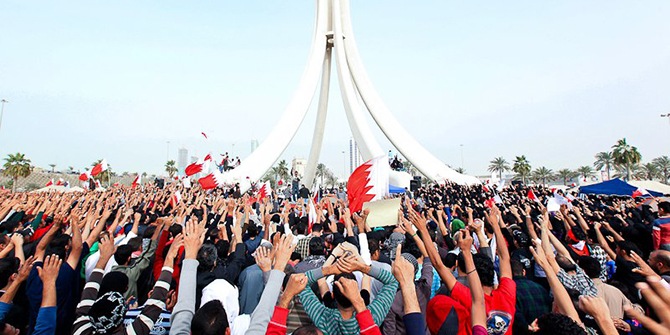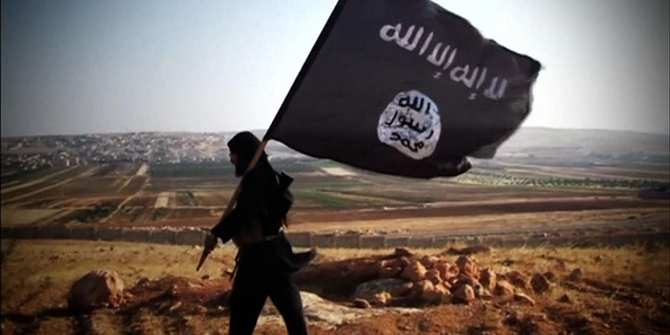by Christopher M. Davidson
 The arrest of Bahraini opposition leader Sheikh Ali Salman on 30th December 2014 caught many by surprise – it had been widely assumed to be something of a ‘red line’, both for domestic Bahraini politics, and for the kingdom’s international relations, most notably with its prominent Western allies, the United States and Britain.
The arrest of Bahraini opposition leader Sheikh Ali Salman on 30th December 2014 caught many by surprise – it had been widely assumed to be something of a ‘red line’, both for domestic Bahraini politics, and for the kingdom’s international relations, most notably with its prominent Western allies, the United States and Britain.
As the head of Al Wefaq Society, arguably the largest political bloc in Bahrain, Ali Salman has become something of a figurehead for reform and change, especially since the beginning of the February 14th 2011 ‘Pearl Roundabout’ demonstrations. Pressing for a transition to a proper constitutional monarchy with a fully functioning parliament, Al Wefaq and Ali Salman by no means represent the full spectrum of Bahraini opposition. Some of their critics, including all important youth groups, perhaps rightly believe that any form of monarchical system is now wholly unacceptable given the political violence and repression that has characterised the kingdom in recent years. In their eyes, at least up until recently, Al Wefaq was ultimately a ‘tolerated opposition’ and thus a liability in case a deal was cut with the monarchy at some point in the future, perhaps with American insistence. But to Al Wefaq’s credit, what they have managed to do is keep the mainstream opposition movement peaceful, often in the face of often extreme conditions, including skirmishes between increasingly disaffected youths and heavy-handed security forces, many of whom are foreign mercenaries, and – most worryingly – a marked rise in the number of difficult-to-attribute bombings. Moreover, Al Wefaq has largely succeeded in keeping the Bahraini people mobilised, having organised huge rallies and, most recently, a mass boycott of parliamentary elections.
So why arrest Ali Salman now, especially on such difficult-to-believe charges of ‘inciting violence’? On a basic level the authorities have undoubtedly felt a need to explain away, both for domestic and international consumption, the absence of Al Wefaq from the currently toothless parliament. As such, a largely evidence-free picture continues to be built up of Al Wefaq’s connections to foreign powers and other unspecified unsavoury elements. This has also led to the house of Bahrain’s most prominent Shi’a cleric being raided – previously considered another ‘red line,’ and now with the president of Al Wefaq’s consultative council also being arrested.
On a bigger and more worrying scale, however, there is also an increasing need for the Bahraini regime, along with its primary paymaster – Saudi Arabia – to demonstrate to their ‘loyalist’ Sunni populations that they have little tolerance for the political mobilisation of supposed ‘fifth column’ Shi’a citizens. With the majority of Bahrainis being Shi’a and with the majority of Saudis in the eastern province being Shi’a – collectively a sort of modern day ‘Greater Bahrain,’ with now visible overlap between their respective opposition movements – the sectarianisation of politics in these countries has been a well-documented regime strategy since the beginning of the Arab Spring. But with the current and strangely rapid rise of the Islamic State in the destabilised Arab North, and with significant levels of sympathy within conservative elements of Saudi and Bahrain’s Sunni communities, the authorities evidently feel a need to re-affirm their hard-line credentials. In doing so at this time, they perhaps feel some comfort that their Western allies, most of which are publicly confronting the Islamic State, will temporarily have little choice but to turn a blind eye to such high risk and antagonistic police state actions in their local coalition partners. In this light, Ali Salman’s arrest, just like the possible execution of prominent Saudi Shi’a cleric Sheikh Nimr Al-Nimr, are best understood as a consequence of disappearing red lines that in turn are a function of provisional shifts at both the regional and international level for the authorities in their respective states.
 Christopher Davidson reads Modern History at King’s College, University of Cambridge, before taking his M.Litt and Ph.D in Political Science at the University of St. Andrews. He has lived and worked in Abu Dhabi, Dubai, and Beirut. He tweets at @dr_davidson
Christopher Davidson reads Modern History at King’s College, University of Cambridge, before taking his M.Litt and Ph.D in Political Science at the University of St. Andrews. He has lived and worked in Abu Dhabi, Dubai, and Beirut. He tweets at @dr_davidson
Other posts in the series:
- Bahrain redux, by Neil Partrick
- The deepening divide in post-election Bahrain, by Marc Owen Jones
- Radical spatial-demographic transformations: the need for an intersectional view, by Mohammed AlDaaysi
- Britain’s base and Bahraini politics, by Jane Kinninmont
- The path to reform in Bahrain, by Ali Alaswad





